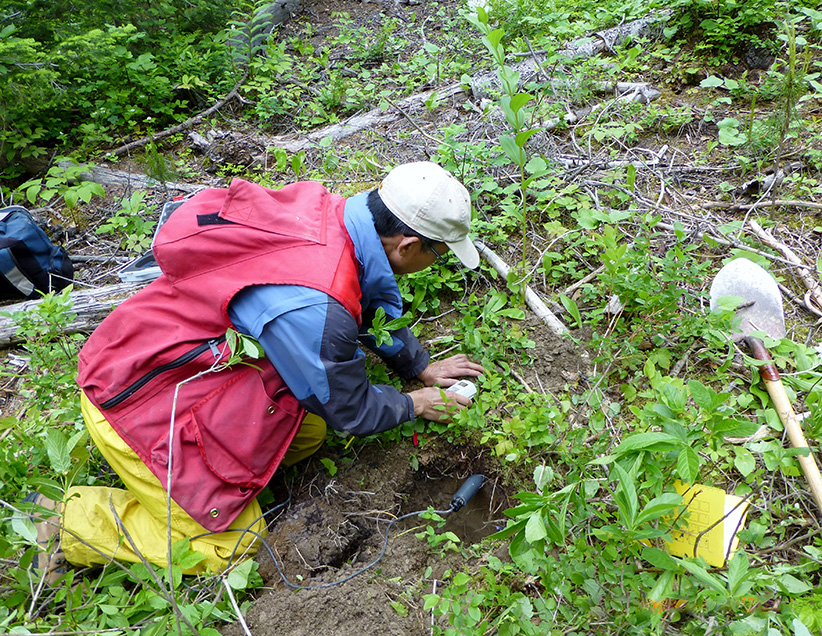College of New Caledonia features 12,500-hectare research forest
Thousands of hectares of forest offer students the chance to do serious research
The College of New Caledonia’s research forest. (College of New Caledonia)
Share

From learning foundational map-and-compass skills to exploring the link between climate change and spruce bark beetles, students at the College of New Caledonia (CNC) spend a lot of time in the college’s 12,500 hectares of research forest.
The two-year Natural Resources and Environmental Technology (NRET) diploma program is the only one in British Columbia with access to that kind of asset, which Richard Reich, the school’s new Industrial Research Chair for Colleges in Forest Health, says gives students a leg up when they’re ready to enter the workforce. “These guys are actually working on the highest-level research projects that exist,” he says. “They’re answering the most important or most urgent forest-health-related questions the forest sector is dealing with.”
Reich was appointed to the five-year position in September 2016 after more than 25 years working as a forest pathologist, identifying and managing tree diseases. “I envy the training these [students] have because they have so much practical knowledge,” says Reich, who, as an instructor at CNC, works directly with a handful of students on their research and teaches a class on forest health. This year, he was able to hire more than a quarter of the 22-student cohort as research assistants, an opportunity rarely afforded to students in a two-year diploma program.
Jess Whalen came to CNC’s Prince George campus after working as a forestry assistant for four years in Smithers, B.C. She says having direct access to Reich’s expertise and being able to work in an actual forest pushed her as a researcher. “I’ve learned more this summer than I probably would have in years of industry work.”
READ: College of New Caledonia | Prince George, B.C. | Founded 1969
Whalen graduated in 2016 and is thinking of continuing her studies in forestry at the University of Alberta, something she says the program’s intensity has prepared her for. “There wasn’t any downtime throughout the program. Something was always happening, something was always due, always under time pressure. It was exhausting, but rewarding.”
This year, more than 20 research projects are taking place across the eight unique bio-zones spread over 12 forest plots. In their second year of study, students choose from a selection of research questions developed by instructors. They then head into the woods, armed with the field skills and theory acquired in first year, and look for evidence-based answers.
The forest is managed by business partner Dunkley Lumber, which harvests a portion of the stands each year. Dunkley purchases the wood from the college, which provides revenue to the NRET program, established through a partnership with industry and government in 2009.
Natural-resource extraction has major implications for the future of B.C., economically and environmentally. For instance, as the spruce bark beetle continues to expand its range on the heels of the devastating mountain pine beetle epidemic, “forestry is becoming extremely more challenging,” says instructor Andrea Erwin. “We’re going to require even more skilled workers to meet those challenges.”
To do that, the college’s department of applied research and innovation is supporting the NRET program to take on long-term studies, giving students and faculty a chance to observe and ask questions about the impact of climate change on any number of ecological aspects. “Sustainability, I think, underpins natural-resource management now . . . [businesses are] all managed at that triple bottom line. There are economic aspects to their management but also environmental and social as well,” says Hardy Griesbauer, director of applied research and innovation at CNC.
The NRET program in Prince George aims to give students a broad base of both technical and research skills that can be applied to forestry, mining, fisheries, oil, gas and any number of industry projects proposed for northern and central British Columbia. “These are real problems we’re working on,” says Reich, who adds that industry is looking for students with research and practical skills. Graduates need to be able to formulate research questions, gather data and work with industry to innovate new ways of doing business. That, he says is the goal and purpose of the research forest.
[widgets_on_pages id=”Education”]